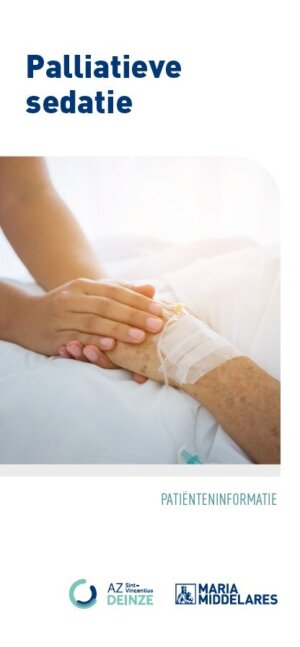Palliative case and advance care planning
Advance care planning
Advance care planningEveryone has an opportunity to think about future care. This means that all patients (including those in non-palliative situations) with questions about the end of life or about whether or not to go for treatment in specific situations can have an advance care planning conversation with a care provider. If they wish, it is possible to draw up a will.
To draw up a will, you can contact your attending physician at our hospital or make an appointment with a nurse from the Palliative Care Support Team (+32 (0)9 246 27 50). They will give you the necessary explanations and, where necessary, support you with arranging a number of important documents (e.g. health and end-of-life living wills, including negative living wills, euthanasia living wills and organ donation statements).
Note: those documents are in Dutch. You can use a translation tool to translate them.
If a patient has a living will, this document is added to the medical record with the patient's agreement.
Palliative care
Palliative careThe care we provide in our hospital does not stop when a patient can no longer cover and the end of life is approaching. Even in this situation, we can still do a lot for patients and their loved ones, medically and in terms of nursing care, psychologically and socially, philosophically and spiritually. The combination of care on approaching the end of life is called palliative care, underlining that this care is no longer associated with just the last three months of life.
Our hospital explicitly opts for a policy for a dignified end of life and on the basis of its attitude of ‘Healthcare with a Soul', inspired by a Christian vision of humanity.
Integration of palliative care into each department
Patients for whom recovery is no longer possible are surrounded with the most careful care in our hospital. Our hospital does not have a separate palliative ward. We do integrate palliative care into every department, with expert support from a hospital-wide palliative support team. During this phase of life, we want to offer humane, total care that takes account of the physical, ethical, mental, social and spiritual needs of the patients and their loved ones. If children are involved in the farewell, we want to support the family as much as possible.
Only available in Dutch:

Kinderen en afscheid nemen
DownloadOur hospital promotes a palliative care culture based on a Christian vision of humanity that considers every person's life valuable from start to finish. Every colleague is involved in this palliative care culture. Precisely because of this vision, we respect a diversity of ethical perspectives and beliefs. We opt for person-centred care and aim to provide a caring and careful response to any question about and at the end of life.
Palliative Care Support Team
Palliative Care Support TeamEvery patient who is in a palliative phase is entitled to expert multidisciplinary support, framed in humane and dignified total care. The palliative support team has an active presence in the hospital and supports the provision of expert quality palliative care.
The palliative support team consists of a number of nurses, palliative physicians, psychologists and a pastoral employee. With practice, specific training and frequent joint consultation, members of the team have gained expertise and experience in supporting patients and their loved ones in these circumstances.
The team holds weekly staff meetings and supports communication with and between patients, physicians and relatives.
Who can contact the team?
All patients, including those who are not in a palliative situation, and their loved ones can ask end-of-life questions. In doing so, they can call on the Palliative Care Support Team. The team is available by phone, e-mail or through your attending physician or care providers at the hospital.
The attending physician always remains the central point of contact.
Palliative sedation and euthanasia
Palliative sedation and euthanasiaIt is important to make a clear distinction between these two concepts.
- Palliative sedation means inducing sleep in terminal patients who suffer distress during the dying phase (pain, shortness of breath, hiccups, exhaustion, panic, etcetera) and for whom ‘normal’ medication no longer can provide enough comfort. To offer maximum comfort, sleep medication is administered, ensuring the patient is asleep and no longer experiences intolerable distress.
Only available in Dutch:

Palliatieve sedatie
Download- Euthanasia means the act of intentionally ending life by another person than the person themselves, at their explicit request. Euthanasia execution is not a patient's right. A patient may ask for it within a legally specified framework, but a physician is never obliged to comply with the request.
How do we deal with euthanasia requests?
In our hospital, every request for euthanasia is taken seriously. The request and its motives are further explored in accordance a careful procedure in line with the law.
Decisions regarding the end of life are always taken in the context of a relationship of trust with the physician. This also involves loved ones. The palliative support team is always called in when a euthanasia request is made. Together with the physician and the attending team, they guide patient and family through the euthanasia process.
If you have any questions, contact one of the palliative supportteam members
Contact information
Contact informationPalliative Care physicians
Palliative Care coordinator
Palliative nurses
Pastor
Psychologist
These team members can also be reached through a nurse on the ward.
Something wrong or unclear on this page? Report it.


















